Jörg Pührer
Weighted Abstract Dialectical Frameworks: Extended and Revised Report
Sep 07, 2018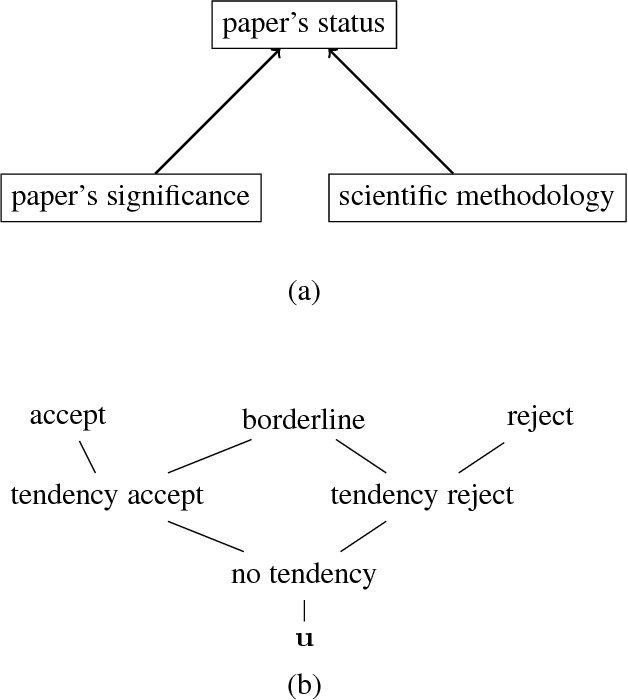
Abstract:Abstract Dialectical Frameworks (ADFs) generalize Dung's argumentation frameworks allowing various relationships among arguments to be expressed in a systematic way. We further generalize ADFs so as to accommodate arbitrary acceptance degrees for the arguments. This makes ADFs applicable in domains where both the initial status of arguments and their relationship are only insufficiently specified by Boolean functions. We define all standard ADF semantics for the weighted case, including grounded, preferred and stable semantics. We illustrate our approach using acceptance degrees from the unit interval and show how other valuation structures can be integrated. In each case it is sufficient to specify how the generalized acceptance conditions are represented by formulas, and to specify the information ordering underlying the characteristic ADF operator. We also present complexity results for problems related to weighted ADFs.
Reactive Multi-Context Systems: Heterogeneous Reasoning in Dynamic Environments
Dec 11, 2017
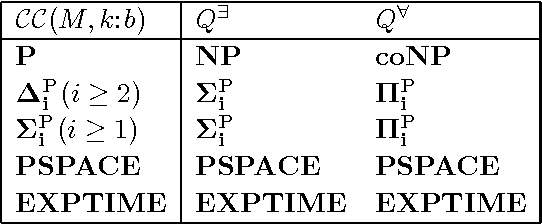

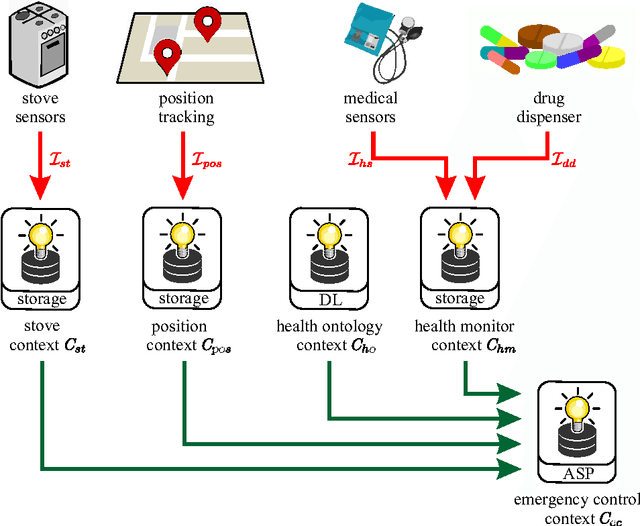
Abstract:Managed multi-context systems (mMCSs) allow for the integration of heterogeneous knowledge sources in a modular and very general way. They were, however, mainly designed for static scenarios and are therefore not well-suited for dynamic environments in which continuous reasoning over such heterogeneous knowledge with constantly arriving streams of data is necessary. In this paper, we introduce reactive multi-context systems (rMCSs), a framework for reactive reasoning in the presence of heterogeneous knowledge sources and data streams. We show that rMCSs are indeed well-suited for this purpose by illustrating how several typical problems arising in the context of stream reasoning can be handled using them, by showing how inconsistencies possibly occurring in the integration of multiple knowledge sources can be handled, and by arguing that the potential non-determinism of rMCSs can be avoided if needed using an alternative, more skeptical well-founded semantics instead with beneficial computational properties. We also investigate the computational complexity of various reasoning problems related to rMCSs. Finally, we discuss related work, and show that rMCSs do not only generalize mMCSs to dynamic settings, but also capture/extend relevant approaches w.r.t. dynamics in knowledge representation and stream reasoning.
Stepwise Debugging of Answer-Set Programs
May 18, 2017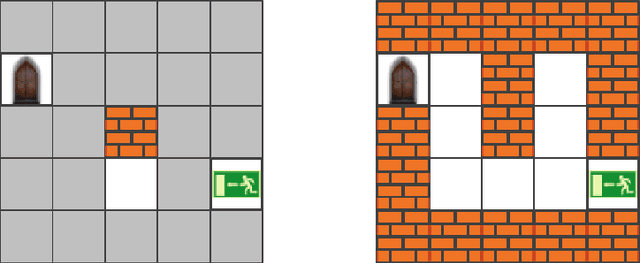
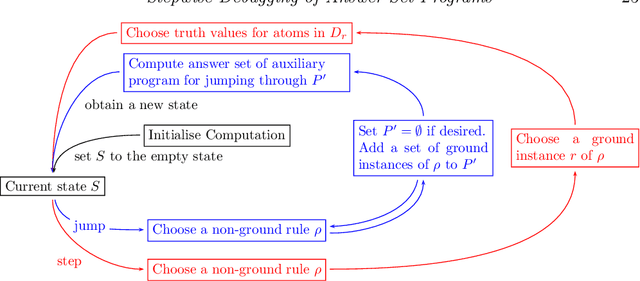
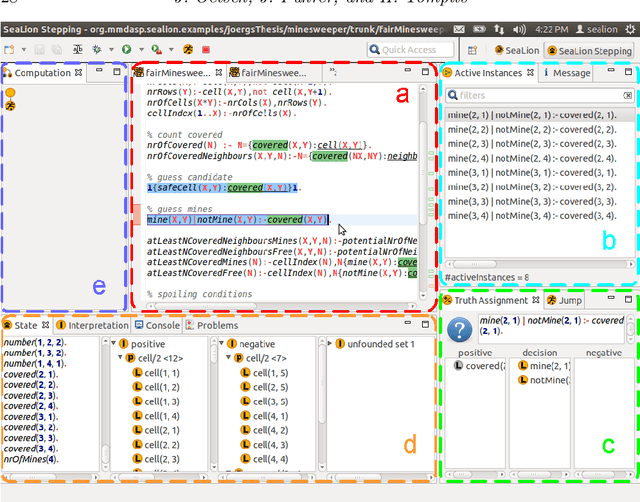
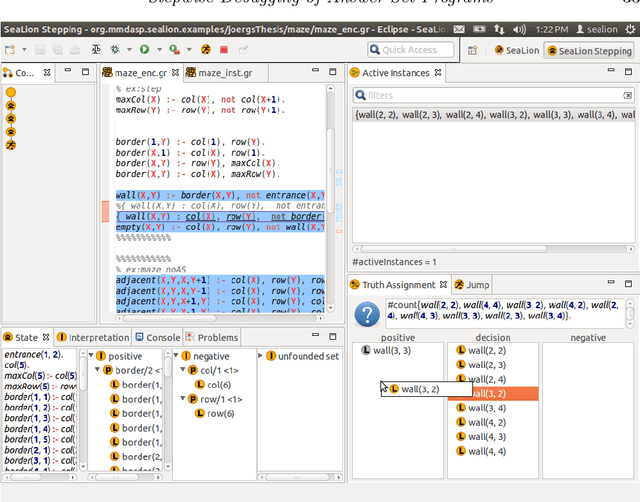
Abstract:We introduce a stepping methodology for answer-set programming (ASP) that allows for debugging answer-set programs and is based on the stepwise application of rules. Similar to debugging in imperative languages, where the behaviour of a program is observed during a step-by-step execution, stepping for ASP allows for observing the effects that rule applications have in the computation of an answer set. While the approach is inspired from debugging in imperative programming, it is conceptually different to stepping in other paradigms due to non-determinism and declarativity that are inherent to ASP. In particular, unlike statements in an imperative program that are executed following a strict control flow, there is no predetermined order in which to consider rules in ASP during a computation. In our approach, the user is free to decide which rule to consider active in the next step following his or her intuition. This way, one can focus on interesting parts of the debugging search space. Bugs are detected during stepping by revealing differences between the actual semantics of the program and the expectations of the user. As a solid formal basis for stepping, we develop a framework of computations for answer-set programs. For fully supporting different solver languages, we build our framework on an abstract ASP language that is sufficiently general to capture different solver languages. To this end, we make use of abstract constraints as an established abstraction for popular language constructs such as aggregates. Stepping has been implemented in SeaLion, an integrated development environment for ASP. We illustrate stepping using an example scenario and discuss the stepping plugin of SeaLion. Moreover, we elaborate on methodological aspects and the embedding of stepping in the ASP development process.
Stream Packing for Asynchronous Multi-Context Systems using ASP
Nov 17, 2016
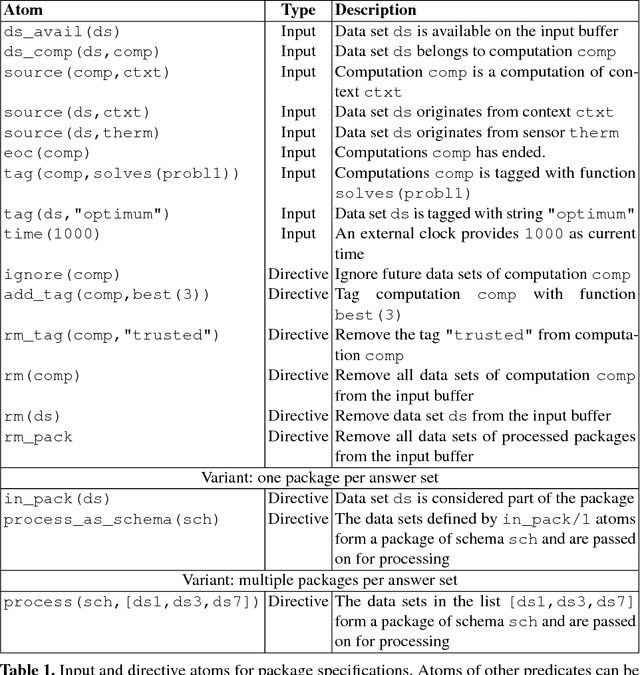
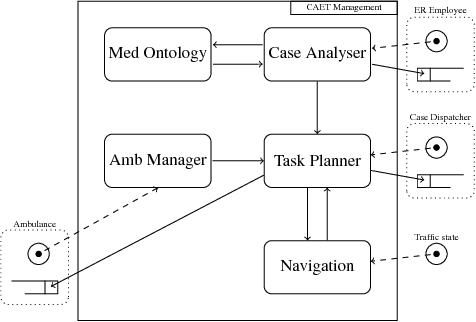
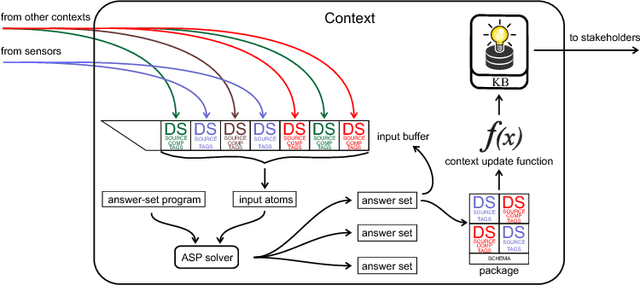
Abstract:When a processing unit relies on data from external streams, we may face the problem that the stream data needs to be rearranged in a way that allows the unit to perform its task(s). On arrival of new data, we must decide whether there is sufficient information available to start processing or whether to wait for more data. Furthermore, we need to ensure that the data meets the input specification of the processing step. In the case of multiple input streams it is also necessary to coordinate which data from which incoming stream should form the input of the next process instantiation. In this work, we propose a declarative approach as an interface between multiple streams and a processing unit. The idea is to specify via answer-set programming how to arrange incoming data in packages that are suitable as input for subsequent processing. Our approach is intended for use in asynchronous multi-context systems (aMCSs), a recently proposed framework for loose coupling of knowledge representation formalisms that allows for online reasoning in a dynamic environment. Contexts in aMCSs process data streams from external sources and other contexts.
Characterizing Realizability in Abstract Argumentation
Mar 31, 2016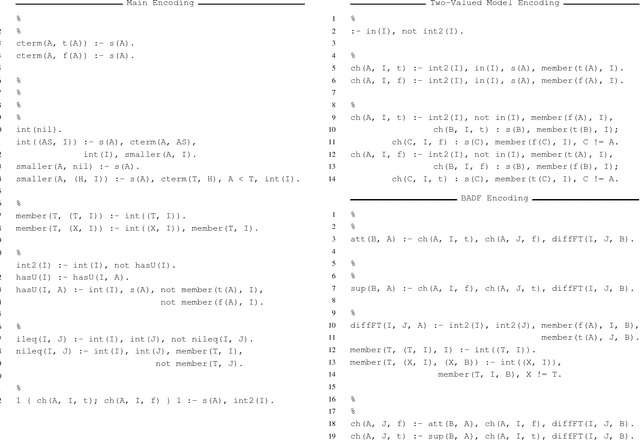
Abstract:Realizability for knowledge representation formalisms studies the following question: given a semantics and a set of interpretations, is there a knowledge base whose semantics coincides exactly with the given interpretation set? We introduce a general framework for analyzing realizability in abstract dialectical frameworks (ADFs) and various of its subclasses. In particular, the framework applies to Dung argumentation frameworks, SETAFs by Nielsen and Parsons, and bipolar ADFs. We present a uniform characterization method for the admissible, complete, preferred and model/stable semantics. We employ this method to devise an algorithm that decides realizability for the mentioned formalisms and semantics; moreover the algorithm allows for constructing a desired knowledge base whenever one exists. The algorithm is built in a modular way and thus easily extensible to new formalisms and semantics. We have also implemented our approach in answer set programming, and used the implementation to obtain several novel results on the relative expressiveness of the abovementioned formalisms.
Towards a Simulation-Based Programming Paradigm for AI applications
May 20, 2015Abstract:We present initial ideas for a programming paradigm based on simulation that is targeted towards applications of artificial intelligence (AI). The approach aims at integrating techniques from different areas of AI and is based on the idea that simulated entities may freely exchange data and behavioural patterns. We define basic notions of a simulation-based programming paradigm and show how it can be used for implementing AI applications.
Asynchronous Multi-Context Systems
May 20, 2015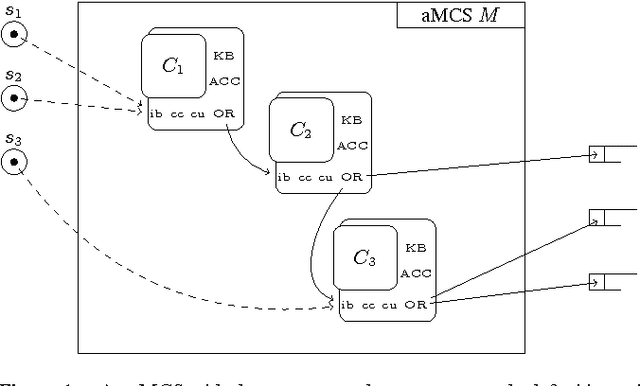
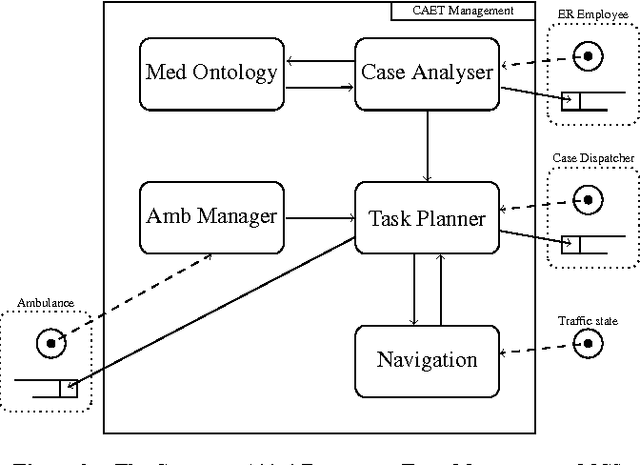
Abstract:In this work, we present asynchronous multi-context systems (aMCSs), which provide a framework for loosely coupling different knowledge representation formalisms that allows for online reasoning in a dynamic environment. Systems of this kind may interact with the outside world via input and output streams and may therefore react to a continuous flow of external information. In contrast to recent proposals, contexts in an aMCS communicate with each other in an asynchronous way which fits the needs of many application domains and is beneficial for scalability. The federal semantics of aMCSs renders our framework an integration approach rather than a knowledge representation formalism itself. We illustrate the introduced concepts by means of an example scenario dealing with rescue services. In addition, we compare aMCSs to reactive multi-context systems and describe how to simulate the latter with our novel approach.
Multi-Context Systems for Reactive Reasoning in Dynamic Environments
May 20, 2015
Abstract:We show in this paper how managed multi-context systems (mMCSs) can be turned into a reactive formalism suitable for continuous reasoning in dynamic environments. We extend mMCSs with (abstract) sensors and define the notion of a run of the extended systems. We then show how typical problems arising in online reasoning can be addressed: handling potentially inconsistent sensor input, modeling intelligent forms of forgetting, selective integration of knowledge, and controlling the reasoning effort spent by contexts, like setting contexts to an idle mode. We also investigate the complexity of some important related decision problems and discuss different design choices which are given to the knowledge engineer.
Annotating Answer-Set Programs in LANA?
Oct 08, 2012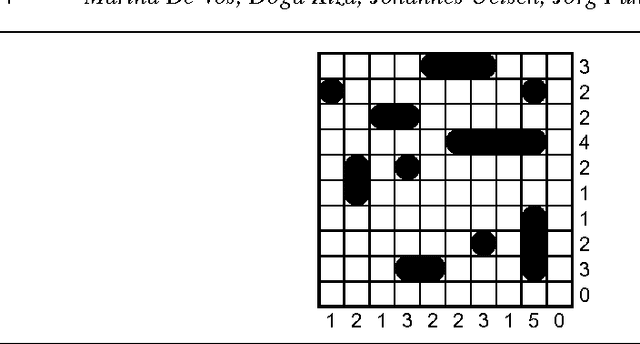
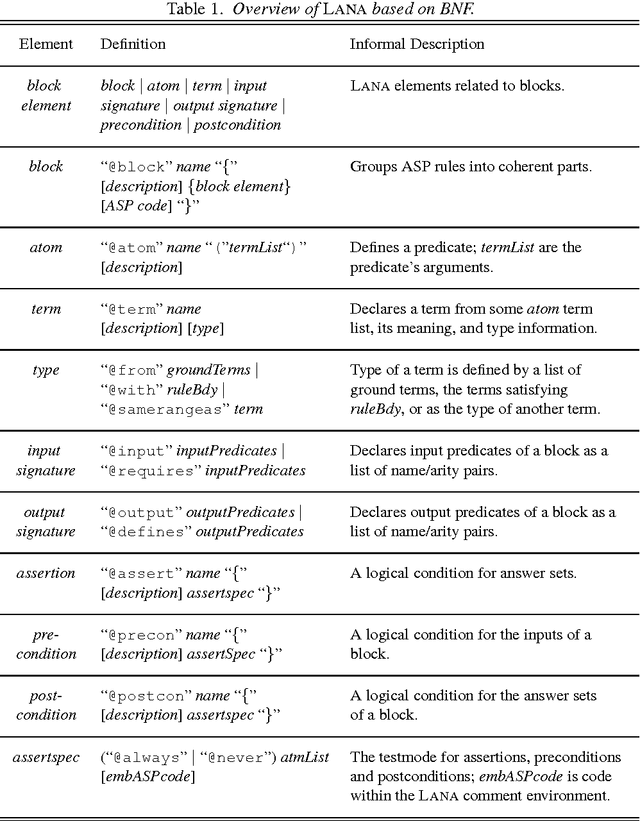
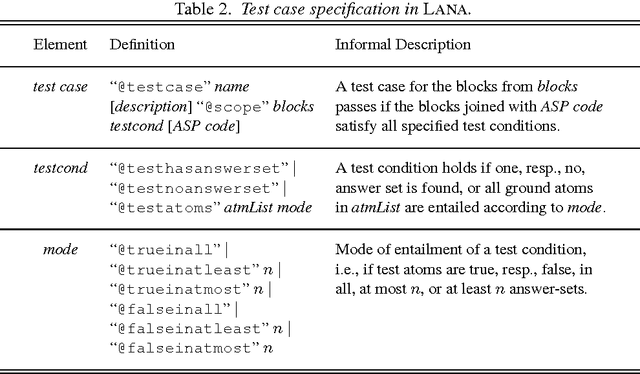
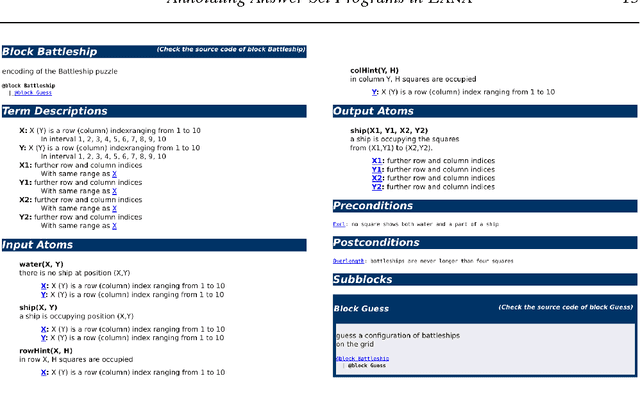
Abstract:While past research in answer-set programming (ASP) mainly focused on theory, ASP solver technology, and applications, the present work situates itself in the context of a quite recent research trend: development support for ASP. In particular, we propose to augment answer-set programs with additional meta-information formulated in a dedicated annotation language, called LANA. This language allows the grouping of rules into coherent blocks and to specify language signatures, types, pre- and postconditions, as well as unit tests for such blocks. While these annotations are invisible to an ASP solver, as they take the form of program comments, they can be interpreted by tools for documentation, testing, and verification purposes, as well as to eliminate sources of common programming errors by realising syntax checking or code completion features. To demonstrate its versatility, we introduce two such tools, viz. (i) ASPDOC, for generating an HTML documentation for a program based on the annotated information, and (ii) ASPUNIT, for running and monitoring unit tests on program blocks. LANA is also exploited in the SeaLion system, an integrated development environment for ASP based on Eclipse. To appear in Theory and Practice of Logic Programming
Extending Object-Oriented Languages by Declarative Specifications of Complex Objects using Answer-Set Programming
Dec 06, 2011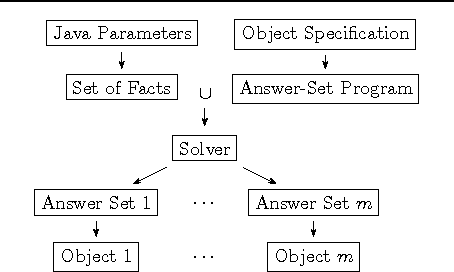
Abstract:Many applications require complexly structured data objects. Developing new or adapting existing algorithmic solutions for creating such objects can be a non-trivial and costly task if the considered objects are subject to different application-specific constraints. Often, however, it is comparatively easy to declaratively describe the required objects. In this paper, we propose to use answer-set programming (ASP)---a well-established declarative programming paradigm from the area of artificial intelligence---for instantiating objects in standard object-oriented programming languages. In particular, we extend Java with declarative specifications from which the required objects can be automatically generated using available ASP solver technology.
 Add to Chrome
Add to Chrome Add to Firefox
Add to Firefox Add to Edge
Add to Edge